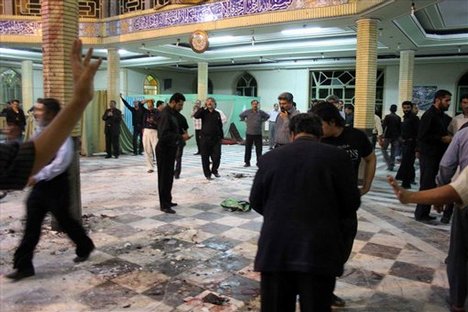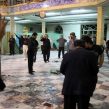
Sunni Terrorists Strike Shi’a Mosque in Iran’s Sistan-Baluchistan Province
Publication: Terrorism Monitor Volume: 7 Issue: 16
By:

Iranian authorities in the southeastern region of Sistan and Baluchistan hung three men in public on May 30 for their role in a mosque bombing that killed 25 and injured over 100 worshippers in the city of Zahedan two days earlier. The men were convicted of providing explosives used in the attack and had allegedly confessed to complicity, according to a local judiciary official (IRNA, May 30). The Sunni terrorist group, Jondollah (“Soldiers of God”) claimed responsibly for the bombings.
Two days later, Zahedan witnessed major street riots and clashes between security forces and an angry mob protesting the decision by Mowlavi Abdolhamid, the Sunni Friday prayer leader, to attend a memorial service for the victims of the bomb attack. While security was restored by local police, five people died in the riots as one bank was torched, and three people were injured when gunmen opened fire at the campaign headquarters of Iranian President Mahmoud Ahmadinejad (Press TV, June 1; Fars News Agency, May 29). On the same day, security personnel defused a homemade bomb found on a domestic “Kish Air” flight carrying 131 people.
The Zahedan bombing was the third such attack by Jondollah in the last twelve months. The central government’s control over the underdeveloped province of Sistan and Baluchistan has never been strong and economic development and public infrastructure is still inferior compared to the rest of Iran. The latest bombing and other violent incidents coincide with the ongoing campaign in Iran leading to the June 12 presidential election. Iran’s political establishment was quick to blame foreign governments for the attacks. The Supreme Leader, Ayatollah Ali Khamenei, urged unity to “confront enemy plots,” while Speaker of the House Ali Larijani accused the United States of instigating the attack through Jondollah (IRNA, May 30; Press TV, May 31).
Jondollah’s raison d’être has less to do with secessionist ambitions than with the objective of drawing attention to the plight of the people of Sistan and Baluchistan. The group’s leader is Abdolmalek Rigi, who looks back on more of a criminal career than a political one. Lacking any religious credentials, his ideology has virtually no jihadist rhetoric but instead focuses on the “protection of national and religious rights of the Baluch tribe and Sunnis in Sistan and Baluchistan” (Fararu, December 17, 2008). In an interview with Roozonline.com in May 2006, Rigi stated, “Since the Revolution until today, the Sunnis have remained the most impoverished group in the country… we realized that there is no other way than to take up arms and begin an armed struggle.” It is unclear how much authority Rigi enjoys over his group and to what extent he can legitimately claim to be heading the Baluch nationalist movement. Since hostage-taking, drug-trafficking and smuggling fund the group’s terrorist activities, Rigi has to contend with criminal networks and mercenaries in the region.
Jondollah denies any links to the Taliban but has strong ties to Baluch tribes and militias in neighboring Pakistan. Iranian security and judiciary officials continue to claim their intelligence indicates that the group is being funded and provided with information by Britain and the United States (Vision of the Islamic Republic of Iran, December 13, 2008). Jondollah, however, makes frequent use of international media outlets, including monarchist TV stations based in Europe and the U.S.. Voice of Baluch is based in Sweden and seems to enjoy very good relations with Dubai-based Al-Arabiyah TV, which has, on several occasions, aired footage showing Jondollah members with Iranian military hostages (Tabnak News, June 20, 2008).
Jondollah’s tactics include assassinations, bombings and kidnappings. In 2006, the group launched a series of attacks targeting Iranian security personnel and local authorities. In March 2006, members of the group disguised as policemen shut down part of the Kerman-Bam highway and stopped a convoy carrying civilian officials and members of the local security force. Jondollah executed all 22 officials and took several civilians hostage (Mardom-Salari, 15 May 2006). Two months later, on the same road, the group killed another 12 travelers and took several others hostage (BBC, May 21, 2006). Gaining more operational strength, the group moved on to target military bases and convoys in 2007, killing 22 Revolutionary Guards and Basiji in the city of Tasuki (Sistan-Baluchestan Provincial TV, March 15, 2007). Abdolmalek Rigi’s boldest move came in June 2008, when his group kidnapped 16 policemen at the Iran-Pakistan border and demanded the release of 200 imprisoned Baluchi militiamen. Despite setting up a joint security committee between Islamabad and Tehran, neither counterterrorism strategies nor negotiations proved effective, with the group eventually killing all the police hostages in December 2008 (Mehr News Agency, December 4, 2008).
The killing of the policemen was met with stepped up security and concerted efforts to destroy the group. Since then, Iran’s Islamic Revolutionary Guard Corps (IRGC) and the regular army have increased their presence in the region, staged large-scale maneuvers, stepped up intelligence cooperation with Pakistan and provided border checkpoints with modern surveillance cameras. Iran’s police chief, Brigadier General Esma’il Ahmadi-Moqaddam stated in March that over $150 million has been allocated to strengthen border security (Press TV, March 26). Since January 2008, concerted aerial and ground-based counterterrorism efforts by the IRGC have led to numerous violent clashes at border checkpoints and isolated security posts and the confiscation of significant amounts of opiates. According to border police commander, Ebrahim Karimi, the fighting has so far claimed the lives of 120 rebels and 19 servicemen (Press TV, January 21).
By and large, the most recent attack at the Shi’a mosque in Zahedan and the subsequent sectarian violence indicates that Jondollah’s operational and tactical strength is far from broken and that an alienated Sunni-Baluchi minority is now openly challenging the central government’s authority. Since presidential elections are scheduled for June 12, and incumbent President Mahmoud Ahmadinejad seems to be losing ground to his reformist rival, Mir-Hossein Moussavi, the government is trying to use the situation as an opportunity to call for a united stand behind Ahmadinejad in order to “foil foreign plots.” While stepped up security in the region may lead to electoral interference by security forces, such government rhetoric is unlikely to impress Iran’s largely young electorate. Even though Jondollah has few friends outside Sistan-Baluchistan, the current volatile situation may well be interpreted as yet another manifestation of poor governance and the government’s appalling human rights record.





